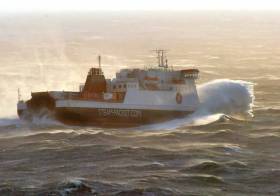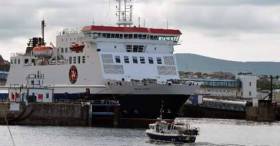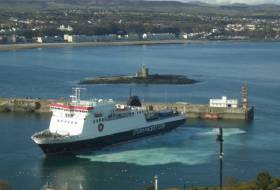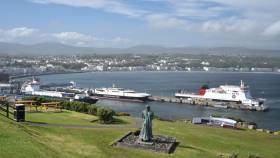Displaying items by tag: Manx Government
#FerryNews - Manx history was made as the islands parliament, the Tynwald voted to take the Isle of Man Steam Packet into public ownership (last) week.
Following a three-hour debate, reports IOMToday, Tynwald voted by 23 votes to one in the Keys and unanimously in LegCo to acquire the ferry company for £124.3m.
The only member to vote against was LibVan leader Kate Beecroft.
Under the deal, negotiated between Treasury and the Steam Packet’s bank and hedge fund owners, government will acquire a 100% shareholding of parent company MIOM Ltd using £124.3m of cash reserves.
To read more on the vote to takeover the Steam Packet, click here.
#FerryNews - Tynwald, the Manx Parliament made history as it voted to take the Isle of Man Steam Packet into public ownership.
According to IOM Today, following a three hour debate, Tynwald voted by 23 votes to one in the Keys and unanimously in LegCo to acquire the ferry company for £124.3m.
The only member to vote against was LibVan leader Kate Beecroft.
Under the deal, negotiated between Treasury and the Packet’s bank and hedge fund owners, government will acquire a 100% shareholding of parent company MIOM Ltd using £124.3m of cash reserves.
Some £76m will appear in the accounts as a loan.
Government will look at options to restructure that loan.
For further reading on the decision to acquire the ferry operator, click here.
#FerryNews - A state-owned Isle of Man Steam Packet would be better for passengers as well as the economy, the Manx Chief Minister believes.
Howard Quayle speaking on Manx Radio has advocated a government takeover of the company since he first stood for the House of Keys in 2011.
Tynwald will be asked on Tuesday to approve the use of reserves to purchase the Steam Packet at a cost of £124 million.
Mr Quayle says the deal will safeguard the Island's 'strategic sea services'.
To hear the Manx minister's comments on the topic, click here for the audio link.
Manx Steam-Packet Rival Plans Takeover Bid
#FerryNews - A shipping line that was set up by a businessman as a planned rival to the Isle of Man Steam Packet has poured scorn over the Manx government’s takeover plan.
As IOM Today reports, Kurt Buchholz founded the Ellan Vannin Line in 2013 in an attempt to launch a roll-on, roll-off daily cargo service between Douglas and Heysham.
But without government support, and no ship, it never got off the ground. He stood as a House of Keys candidate in Douglas Central in the 2016 general election.
Reacting to the announcement of the government's planned £124m deal to buy the Steam Packet, he said: ’The Steam Packet ships are close to scrap value with their age, about £15m.
For more on the story, click here.
#FerryNews - In an announcement today, the Manx Government has plans to acquire the Isle of Man Steam Packet Company (IoMSPC) for £124m.
If approved by Tynwald later this month, BBC News writes the deal would see the government commit to purchase 100% of MIOM Ltd, the IoMSPC's parent company.
Chief Minister Howard Quayle said: "Acquiring the national asset is a once-in-a-generation opportunity."
The IoMSPC provides freight, passenger and vehicle services between Douglas and five ports in the UK and Ireland.
The government has been considering its options since rejecting the company's revised offer of a new strategic sea services agreement in July 2017.
It had proposed to invest £170m in services - including spending £65m on two "state-of-the-art" ships - had its contract been extended.
Treasury Minister Alfred Cannan said: "The deal would immediately bring ferry operations into public ownership but government would not take over the day-to-day running of services."
He said government could "put in place a new agreement within 12 months" if the deal goes ahead.
For more on this story, click here.
Manx Government Considers Buying Isle of Man Steam Packet
#ferrynews - Manx Ministers are drawing up possible plans to buy the Isle of Man Steam Packet, iomtoday has learned.
The move comes as negotiations continue with the ferry operator over a revised strategic sea services deal - and as the Packet announced a 6.4% increase in some fares from 1 January, 2018.
In July, the Tynwald voted not to accept the Steam Packet offer to government and to opt instead to continue negotiations for a better deal. The Packet’s offer had included a pledge to invest £170m in a new fleet, facilities and fare initiatives.
But it is understood that the Council of Ministers is now seriously contemplating taking the ferry operation into public ownership.
Nationalisation or acquisition of the Steam Packet were outlined in a review of options presented in a government report to Tynwald in November last year.
For more on the development, click here.

































































